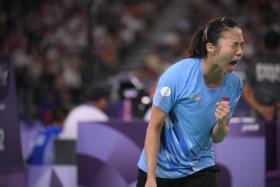Shining the spotlight on mental wellness in sports during circuit breaker
S'pore Sport Institute's psychology department proactively engaging Republic's athletes
The sporting world may have come to an unprecedented standstill due to the Covid-19 pandemic but, in the minds of some athletes, a battle is raging.
The uncertainty, following the postponement of competitions such as this summer's Olympic and Paralympic Games, can evoke different emotions in athletes, which can take a toll on their mental health.
Retired American swimmer Michael Phelps, the most decorated Olympian in history with 23 gold medals, raised the issue during a recent interview.
Using himself as an example, Phelps urged athletes to seek help when necessary, especially with many being unable to leave the house now.
In response to The New Paper's queries, Sport Singapore (SportSG) said its psychologists are taking a proactive approach in tackling the issue.
"It is likely that our athletes might be experiencing frustration and even apprehension of what the immediate future will be like," said the spokesman.
"Anticipating this, Singapore Sport Institute's (SSI) sport psychology department is proactively engaging our athletes through video calls and other means of communication during this circuit breaker."
It is not an easy task. Coming forward could prove to be the biggest challenge, due to the stigma associated with mental health issues, especially among Asians.
"Our Asian culture discourages self-disclosure and help-seeking behaviours," the spokesman said, when asked about the challenges.
Lines such as "no need to tell people", "don't wash your dirty linen in public" and "just endure" are common and borne out of the stigma of being perceived as "weak".
"We have also come across athletes who have sought psychiatric help in a private setting," added the spokesman.
"Sometimes, the feedback comes from their friends or peers, who have observed behavioural abnormality and alerted the sport psychologists."
Perceived "weakness" is not just down to cultural stereotypes. Athletes are also reluctant to come forward as they want to conform to the social construct that they are robust mentally and physically.
"As sporting culture values mental toughness, so do our athletes," the spokesman added.
"Athletes are constantly in an environment where they are monitored and appraised. It is very difficult for our athletes to be tough all the time in this high-pressure, high-stakes daily environment.
"Athletes do need help and support, yet the cases we have seen thus far are but just the tip of the iceberg.
"We have begun to see more athletes, albeit a small number, opening up and sharing their mental health-related issues with their sport psychologists."
When asked what can be done to get more affected athletes to come forward, the spokesman added that the sport psychology department has recently collaborated with the nutrition and medical team at Singapore Sports Medicine Centre to pilot a well-being survey - a medical screening for athletes.
It aims to provide a safe environment for athletes to share with the medical team in areas related to anxiety, depression, sleep and eating disorders.
This survey will provide a first-point assessment in identifying signs and symptoms of athletes who may be experiencing well-being issues. Upon further diagnosis, athletes may then be referred to specialists.
"We hope that this survey will inform us better on the prevalence of mental health issues experienced by our athletes, providing the impetus for appropriate interventions," the spokesman said.
Just as crucial as identifying those in need of help, is being suitably prepared to render aid.
"Upskilling of current sport psychologists at the SSI and National Youth Sports Institute in the area of mental health competencies has already been put into motion."
TOMORROW: FOCUS ON WHAT YOU CAN CONTROL, AND OTHER COPING MECHANISMS
What they say
"As someone who has gone through some really deep stages of depression, and still deals with it, I hope and pray that every one of these athletes gets help with the mental health part of this situation.
"This is a very big thing, and we can't even leave our houses now. So if you're an athlete, go online, pick up the phone, find somebody to talk to."
- Retired swimmer Michael Phelps, the most decorated Olympian in history with 23 gold medals
"After it being postponed, which we've never seen before, next year it's going to be the biggest Olympics we've ever seen.
"So, if you are able to stand up and swim well there, you are going to cement yourself as one of the greats of the sport.
"That's something which is motivating me through this period where I am not able to swim. If I do manage to swim well next year, I'll be remembered for a good while to come."
- Australia's Olympic 100m freestyle champion Kyle Chalmers
"It is likely that our athletes might be experiencing frustration and even apprehension of what the immediate future will be like.
"Anticipating this, Singapore Sport Institute's (SSI) sport psychology department is proactively engaging our athletes through video calls and other means of communication during this circuit breaker."
- SportSG's spokesman, when asked if they have seen a rising number of athletes with mental health issues
Get The New Paper on your phone with the free TNP app. Download from the Apple App Store or Google Play Store now


